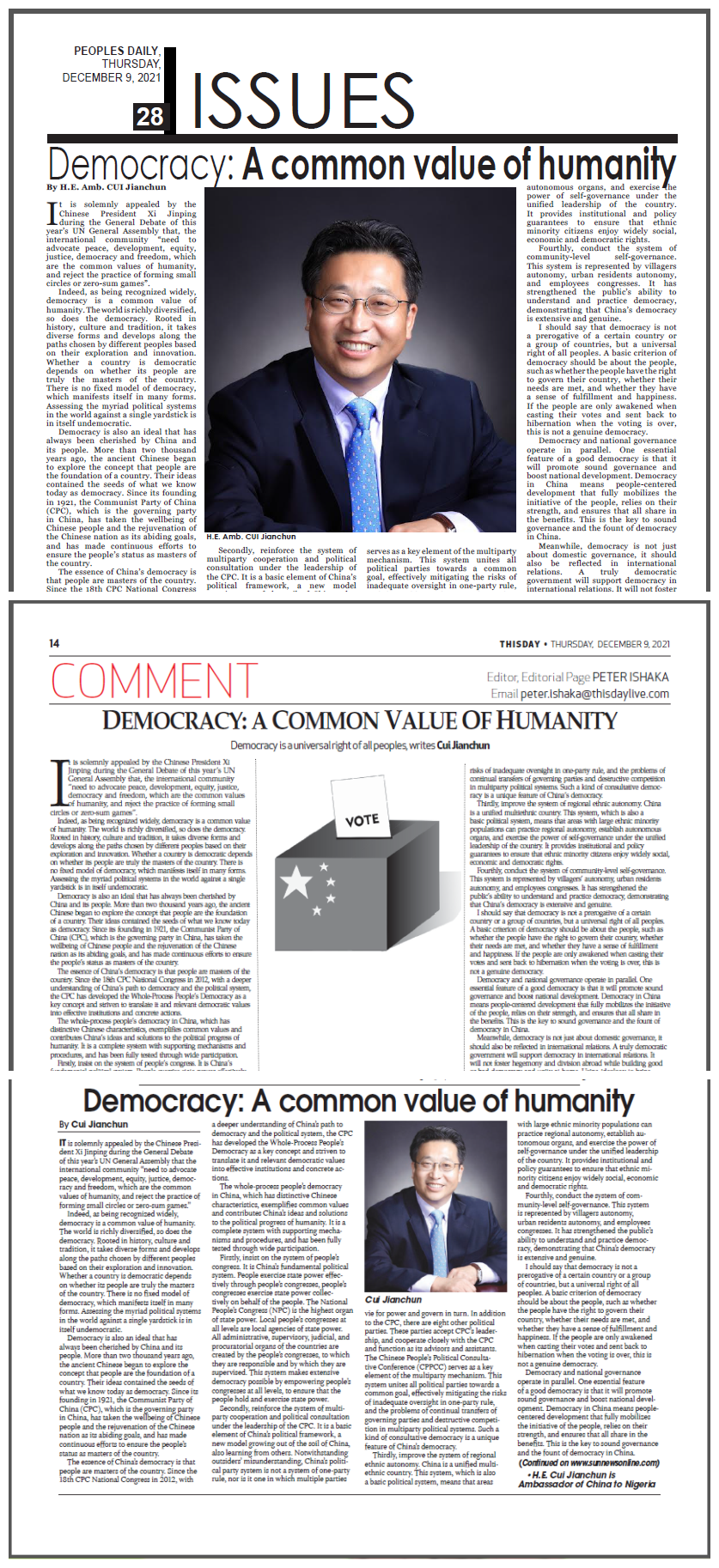Democracy:A common value of humanity
On December 9th, 2021, Nigerian newspapers Peoples Daily, This Day, Daily Sun published an article written by Ambassador of China to Nigeria H.E. CUI Jianchun, with the theme of Democracy:A Common Value of Humanity. The full text goes as follows:

It is solemnly appealed by the Chinese President Xi Jinping during the General Debate of this year’s UN General Assembly that, the international community “need to advocate peace, development, equity, justice, democracy and freedom, which are the common values of humanity, and reject the practice of forming small circles or zero-sum games”.
Indeed, as being recognized widely, democracy is a common value of humanity. The world is richly diversified, so does the democracy. Rooted in history, culture and tradition, it takes diverse forms and develops along the paths chosen by different peoples based on their exploration and innovation. Whether a country is democratic depends on whether its people are truly the masters of the country. There is no fixed model of democracy, which manifests itself in many forms. Assessing the myriad political systems in the world against a single yardstick is in itself undemocratic.
Democracy is also an ideal that has always been cherished by China and its people. More than two thousand years ago, the ancient Chinese began to explore the concept that people are the foundation of a country. Their ideas contained the seeds of what we know today as democracy. Since its founding in 1921, the Communist Party of China (CPC), which is the governing party in China, has taken the wellbeing of Chinese people and the rejuvenation of the Chinese nation as its abiding goals, and has made continuous efforts to ensure the people's status as masters of the country.
The essence of China's democracy is that people are masters of the country. Since the 18th CPC National Congress in 2012, with a deeper understanding of China's path to democracy and the political system, the CPC has developed theWhole-Process People's Democracy as a key concept and striven to translate it and relevant democratic values into effective institutions and concrete actions.
The whole-process people's democracy in China, which has distinctive Chinese characteristics, exemplifies common values and contributes China's ideas and solutions to the political progress of humanity. It is a complete system with supporting mechanisms and procedures, and has been fully tested through wide participation.
Firstly, insist on the system of people's congress. It is China's fundamental political system. People exercise state power effectively through people's congresses, people's congresses exercise state power collectively on behalf of the people. The National People's Congress (NPC) is the highest organ of state power. Local people's congresses at all levels are local agencies of state power. All administrative, supervisory, judicial, and procuratorial organs of the countries are created by the people's congresses, to which they are responsible and by which they are supervised. This system makes extensive democracy possible by empowering people's congresses at all levels, to ensure that the people hold and exercise state power.
Secondly, reinforce the system of multiparty cooperation and political consultation under the leadership of the CPC. It is a basic element of China's political framework, a new model growing out of the soil of China, also learning from others. Notwithstanding outsiders’ misunderstanding, China’s political party system is not a system of one-party rule, nor is it one in which multiple parties vie for power and govern in turn. In addition to the CPC, there are eight other political parties. These parties accept CPC’s leadership, and cooperate closely with the CPC and function as its advisors and assistants. The Chinese People's Political Consultative Conference (CPPCC) serves as a key element of the multiparty mechanism. This system unites all political parties towards a common goal, effectively mitigating the risks of inadequate oversight in one-party rule, and the problems of continual transfers of governing parties and destructive competition in multiparty political systems. Such a kind of consultative democracy is a unique feature of China’s democracy.
Thirdly, improve the system of regional ethnic autonomy. China is a unified multiethnic country. This system, which is also a basic political system, means that areas with large ethnic minority populations can practice regional autonomy, establish autonomous organs, and exercise the power of self-governance under the unified leadership of the country. It provides institutional and policy guarantees to ensure that ethnic minority citizens enjoy widely social, economic and democratic rights.
Fourthly, conduct the system of community-level self-governance. This system is represented by villagers autonomy, urban residents autonomy, and employees congresses. It has strengthened the public's ability to understand and practice democracy, demonstrating that China's democracy is extensive and genuine.
I should say that democracy is not a prerogative of a certain country or a group of countries, but a universal right of all peoples. A basic criterion of democracy should be about the people, such as whether the people have the right to govern their country, whether their needs are met, and whether they have a sense of fulfillment and happiness. If the people are only awakened when casting their votes and sent back to hibernation when the voting is over, this is not a genuine democracy.
Democracy and national governance operate in parallel. One essential feature of a good democracy is that it will promote sound governance and boost national development. Democracy in China means people-centered development that fully mobilizes the initiative of the people, relies on their strength, and ensures that all share in the benefits. This is the key to sound governance and the fount of democracy in China.
Meanwhile, democracy is not just about domestic governance, it should also be reflected in international relations. A truly democratic government will support democracy in international relations. It will not foster hegemony and division abroad while building good or bad democracy and unity at home. Using ideology to bring down other countries, and promote a geo-strategy for absolute security will lead to division and confrontation, and are obviously anti-democratic.
All in all, there are no identical political systems in the world, neither is there a political model that fits all. Countries can borrow from the successful experience of others and develop forms of democracy suited to their own modernization process. The model that suits best is always the most appropriate.
China did not follow the established path of other countries in its modernization drive. Similarly, China did not duplicate other countries’ models of democracy, but created its own. China's new approach to democracy represents a significant contribution to international politics and human progress.
All paths to democracy, layering, grafting, or combination of layering and grafting, chosen by the peoples themselves deserve proper respect. The Chinese people are willing to work together with all other peoples around the world to carry forward democracy and other common values of humanity, add new elements to the world's political structure, and advance towards a global community of shared future together.
Source: EMBASSY OF THE PEOPLE'S REPUBLIC OF CHINA IN THE FEDERAL REPUBLIC OF NIGERIA
Photos
Related Stories
- Chinese FM calls for promoting true democracy for better future of humankind
- Foreign experts say China's people-centered whole-process democracy of great significance
- Promoting True Democracy for a Better Future of Humankind
- America's democratic backsliding
- Democracy ultimately serves to improve people's livelihood: Carrie Lam
Copyright © 2021 People's Daily Online. All Rights Reserved.










